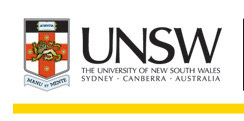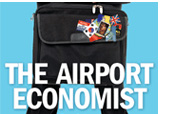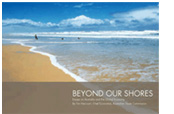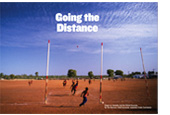Reporting from Rio de Janeiro, Brazil
Brazilian Airports at the moment are jam packed. Why is this so? To an airport economist the underlying reasons must always be economic and in this case thankfully they are. Basically, in the new Brazil, the upper class more wealthy Brazilians are flying north to Miami to shop (even factoring in the cost of flights it’s cheaper to buy in the USA than to pay ‘Brazilian’ prices ) whilst their maids are flying south to Buenos Aires (where at current exchange rates, Argentina is even cheaper).
And all this retail arbitrage is putting pressure on Brazil’s airport infrastructure. Brazil has the excitement (and responsibility) of hosting both the FIFA Football World Cup in 2014 and the Rio Olympics in 2016 and that means Brazil needs a first class airport infrastructure particularly for the World Cup where there are 10 host cities. Airports need to be upgraded and stadiums need to be built. In fact, infrastructure and education few storm clouds in Brazil’s otherwise sunny economic big picture. During the Global Financial Crisis (GFC) Brazil, like Australia, was largely untouched and in 2010 Brazil achieved an especially strong 7.5 per cent economic growth rate. According to Banco Santander economist Adriana Dupita this dropped to 2.7 per cent in 2011, but overall “Brazilian economic growth rates in the 2000s averaged 3.6 per cent which compares favorably to 2.5 per cent in the 1990s and 1.7 per cent in the crisis ridden 1980s.”
In fact, despite Brazil’s emerging status as one of the world’s new economic superpowers (the BRICs – Brazil, Russia, India and China – dubbed famously by Goldman Sachs), Brazil is more of an income distribution story more than a purely economic growth story like China and India. Under the metal worker turned President Lula, Brazil managed to combine fiscal and monetary responsibility with progressive social policies (measures begun by his predecessor Fernando Henrique Cardoso, a social democrat and sociologist, and continued by his handpicked successor President Dilma). The proportion of the population who are very poor ranged to just under 24 per cent of the population in 2002, when Lula was elected but this had shrunk to just over 15 per cent by the end of Lula’s term in office. Importantly, Lula added 31 million people to the middle class which now makes up the bulk of the Brazilian population. A strong emphasis on direct cash payments to the poor (the ‘Bolsa Familia’ programme), an increase in education attainment and anti-crime measures have made Brazil a fairer and more upwardly mobile society. This has boosted demand, creating an aspirational consumer culture, and in good economic policy has been combined with strong social policy with a strong political dividend (Lula left office with a respectable economic record and an 80 per cent approval rating which is the envy of other political leaders in democracies). Lula, thanks to the strength of Brazil’s external position (like Australia, Brazil has surfed China’s economic wave as a key exporter of resources and agricultural products and services), and his own internal policies managed to give to the poor, without having to take from the rich.
Brazil’s income distribution story has brought opportunities for many international companies including those from Australia.
For example, in the retail sector, the growing consumer culture and sheer size of the new Brazilian middle class, has attracted Australia’s retail giant Westfield into the Brazilian market, with a joint venture with Almeida Junior in Brazil’s south around Porto Alegre.
In education, the growth of Brazil’s aspirational classes has attracted Australia’s universities. Whilst I was in Sao Paulo, the Australia Group of 8 universities were there to forge partnerships with their Brazilian counterparts and to join the Scientists with borders programme to add to the stock of Brazilian science and technical training. Australian universities that are strong in Asia and now looking to South America with Brazil at the forefront (there are over 16,000 Brazilian students studying in Australia) together with Chile and Colombia.
And finally in the clean energy sector, Brazil has a high degree of environmental consciousness with is growing as it becomes more affluent and middle class. The Rio plus 20 summit reminds us of how the climate change debate began in earnest with the original high profile Rio Summit in 1992. In Australia’s case, Pacific Hydro is making an important contribution to clean energy, particularly in wind power, with their Australia CEO Rob Grant, describing Brazil as “one of the most exciting prospects in their global business with strong local and regional support.”
In fact, in Sao Paulo, Australian Consul General and Trade Commissioner Greg Wallis, nominates “clean energy along with education, mining and infrastructure related to the World Cup and Olympics are the key sectors where Australia carries a strong reputation and can make a real difference.”
But in closing let’s get back to the Airport. Normally, airport security is usually a nightmare or at least a hassle for the world weary traveler but not in Rio. As I went through security I said to the young woman security guard, “do I have to remove my belt here.” She replied: “Yes you do! And your pants!” Then there was a pause and thankfully she said “I am just kidding!” And then she let out an enormous laugh and gave me a friendly farewell smile as I went to catch my plane back home. Well it seems, given their current economic success and social justice improvements, Brazil sure has a lot to be smiling and laughing about now and it looks like that will continue through to 2014 and 2016 as it hosts the FIFA World Cup and the Rio Olympics.
*Tim Harcourt is the JW Nevile in Economics at the Australian School of Business, UNSW and author of The Airport Economist: www.timharcourt.com













No Comments so far ↓
Comments are closed.